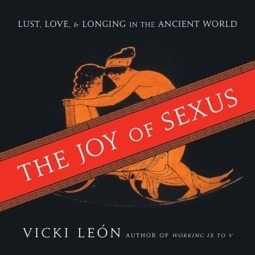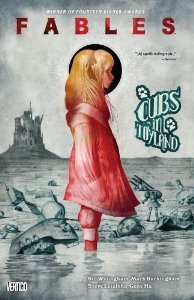Alex C. Telander's Blog, page 61
March 25, 2013
“The Joy of Sexus” by Vicki León (Walker Books, 2013)
Vicki León certainly seems to have an ability for discovering and unearthing the bizarre and unusual, no matter what moment in history it seems to be from. She has written and published books for children, as well as adults, known for her popular anecdotal volumes, Uppity Women and Working IX to V, she now turns to a hotter and more illicit subject in The Joy of Sexus. Many people have heard certain “things” and “rumors” about what certain Romans, or Greeks, or Egyptians or people of the ancient world were up to during those pre-Christian times. In this book, León puts this all to rest with supplied evidence and confirmation or denial of what you might’ve heard or thought you knew to be true.
León is methodical in her approach with The Joy of Sexus, categorizing and laying the details out in an organized manner. She begins with “The Birds, the Bees, & the Body Parts,” covering subjects like aphrodisiacs of the ancient world, circumcision, contraception, pregnancy, and abortion. On numerous occasions León begins with the history, and then links it with either contemporary times or particular times when some of these strange practices were en vogue. Each entry is usually only a couple of pages long, giving the reader the salient and lascivious details, but not dawdling on for too long. Some of the other subjects covered in this book include: masturbation, pornographers, prostitution, Helen of Troy, eunuchs, hermaphrodites, adultery, divorce, gladiator sex lives, menstruation, sexual preference, and so much more.
Perhaps the key to The Joy of Sexus is that it is a short (320 pages) and small book that can easily be concealed in public, and by the same token with the short entries and thorough and exact contents listing, a particular section can easily be turned to and read, and the book quickly secreted away again. Whether you intend to take snippet reads of this book during your daily agenda, or plan to hide out somewhere and read it from cover to cover, the knowledge you will learn from this book will make you the envy at every gala and ball. The Joy of Sexus is also a great ice breaker and conversation starter for parties and social events, or perhaps even a first date.
Originally written on February 19, 2013 ©Alex C. Telander.
To purchase a copy of The Joy of Sexus from Amazon, and help support BookBanter, click HERE.


March 22, 2013
Getting Under Your Skin: An Interview with A. J. Colucci
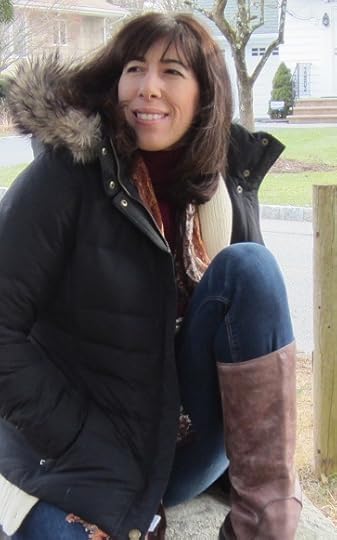 Author A. J. Colucci
Author A. J. Colucci
A.J. Colucci spent 15 years as a reporter, magazine editor and writer for corporate America. Today she is a full time author of science thrillers, stories that combine true science with the riveting plot and breakneck pace of a thriller. Her novel THE COLONY received a starred review from Publishers Weekly, noting, “Michael Crichton fans will hope that this is but the first of many such outings from the author’s pen.” Visit her website www.ajcolucci.com or find her on Twitter https://twitter.com/ajcolucci.
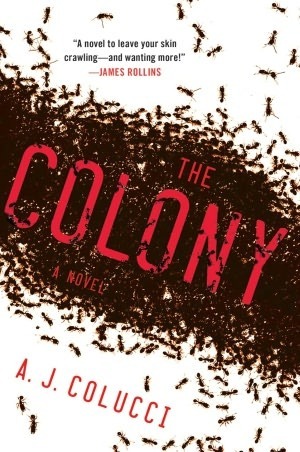
Alex C. Telander: When did you know you wanted to be a writer?
A. J. Colucci: For as long as I can remember. I think if I’d had a pencil in utero, I would have come out with at least a couple short stories.
Alex: Where did the idea for The Colony come from?
A. J.: I was watching a Discovery Channel special on killer ants and got hooked. It was mesmerizing to see a colony of 22 million African driver ants, working like a military unit, to take down every living creature in a farmer’s field. I knew it would make a great book.
Alex: What sort of research did it require?
A. J.: Science thrillers require an enormous amount of research. I started in the library and then spent about a thousand hours on the internet. But I’m an information junkie so subjects like ant morphology and pheromone manipulation are incredibly interesting to me. I was lucky enough to have a few first-rate entomologists and a military expert to verify my facts. I think I probably qualify for some kind of entomology degree.
Alex: Do you plan on writing any sort of sequel or using some of the characters in a future book?
A. J.: I am so busy working on other projects right now, but maybe someday Paul and Kendra will have another adventure.
Alex: How possible in today’s world is the core concept of The Colony?
A. J.: Insect warfare goes back to biblical times, and even earlier. I’ve read that early humans threw bees nests into caves like a primitive form of tear gas. In the 1950s the U.S. military did a lot of testing of entomological warfare, including operations Big Buzz, Big Itch and Drop Kick. You can look it up – I kid you not. Testing for Big Itch involved dropping fleas from the air in cluster bombs. At least one test failed when the fleas were accidentally released into the aircraft and they attacked the crew. I believe Big Buzz and Drop Kick used mosquitoes.
Alex: What do you hope readers get from reading your book?
A. J.: Mostly entertainment. There’s plenty boredom, monotony and despair in the world, so if a book can sweep you into an exciting adventure for a few hours, that’s great. You can get your chills and thrills without having to jump out of an airplane. Of course, it would be nice if readers considered my underlying message of faith in humanity. Ants work for the good of the colony, never for themselves. We could use some of that.
Alex: Do you have plans for your next novel?
A. J.: I’m actually in the first round of edits on my new novel, which is coming out Spring 2014 from St. Martin’s Press. It’s another science thriller about a group of people who come to a remote island in Nova Scotia for the reading of a will, but the island starts to have strange and violent effects on the characters. I like to write about nature because it can be a brutal place—kill or be killed—but it’s also filled with a sort of beauty and logic that makes humans look ridiculous.
Alex: Do you still write nonfiction?
A. J.: Unfortunately there’s not enough time. I think most authors would agree that establishing oneself as a novelist is a full-time job. A single book takes at least a year, and I hope to write many.
Alex: Is it hard to switch between writing fiction and nonfiction?
A. J.: Not for me. The two are so different and require separate parts of the brain. Although much of The Colony was based on fact, so it felt like writing non-fiction at times. For instance, I interviewed a former director at the U.S. Department of Defense about the best way to destroy the ants – he took it very seriously and suggested a neutron bomb, and then he gave me information on deployment and damage. I also had an entomologist from the USDA brainstorm with me on how to get the pheromones spread over the city. So when I sat down to write those chapters it felt realistic.
Alex: Was there a particular reason you chose to use “A. J” for your published name?
A. J.: The initials A.J. are meaningless, but I chose a pen name because I’m a private person and the idea of splashing my name all over the place was jarring. Also, my genre is a tough one for women to break into. I didn’t want to turn off guys that were more comfortable reading names like Michael Crichton, James Rollins and Scott Sigler.
Alex: Who are some of your favorite authors?
A. J.: Besides the three I just mentioned, I’ve built up an endless list over the years in thrillers, horror, literary fiction and old classics. Vonnegut, Orwell, Baldacci, Lehane, Atwood, Hosseini, Hemingway, Dostoyevsky. My tastes run amok.
Alex: What do you like to read?
A. J.: I’ve always read a lot of literary novels and but when I’m writing, which is most of the time, I tend to read thrillers.
Alex: What are you reading at the moment?
A. J.: I just downloaded Gone Girl because when a book is a runaway hit, I just have to know why. Sometimes I never figure it out. Like with Fifty Shades of Grey. What’s up with that?
Alex: What do you like to do in your spare time?
A. J.: I do things with my family, take the kids on a hike or to the beach. I like getting together with other authors, something that’s new to me and such a huge privilege. It’s one of the few perks of being published. Other than that, I’m reading or writing.
Alex: So if the events of The Colony really happened, what would you do?
A. J.: I guess prepare to die, because realistically there’s is nothing in our arsenal that could stop them.


March 20, 2013
Book Report: Michael Vick Gets Dogged, Amazon Wants .book & More!
Way of Kings Ebook $2.99
Leading up to the release of it’s sequel, Brandon Sanderson’s Way of Kings is now only $2.99.
Amazon continues to face heat in trying to secure the .book domain name, as well as others.
To Lure Buyers Away From Amazon
Waterstone’s has come up with an ingenious endeavor with bestselling author Joanne Harris to focus sales on independent bookstores.
An Oddly Modern Antiquarian Bookshop
A hipster’s dream, this little bookshop in Toronto is far more than it appears.


March 19, 2013
Coming March 22: An Interview with A. J. Colucci
A. J. Colucci is the author of the Michael Crichtonesque tech-thriller The Colony.
On March 22 at 9AM PST, an exclusive interview with her will go up on Bookbanter. For now, check out the Bookbanter review of The Colony.


March 18, 2013
Bookbanter Column: Brandon Sanderson: The Hardest Working Writer I Know
Writing books isn’t easy; anyone who tells you otherwise either hasn’t done it, or is an idiot because they haven’t actually done it.
And when an author gets published and fully begins their publishing career, things don’t get a lot easier.
Yes, if one is making enough money, one is able quit their day job and write full time, which sounds wonderful.
But it’s also a lot of hard work, from sitting down and doing all the actual writing, to the editing and revising, then meeting with agents and editors and further revising, then copyediting and proof reading, then publication and all the PR associated with it, then the book tour, and during the publication and PR of the published novel, the author is already working on the next novel.
For more Bookbanter columns, click here.


March 15, 2013
“Fables, Volume 18: Cubs in Toyland” by Bill Willingham and Mark Buckingham (Vertigo, 2013)
The Fables are back again in a new collected volume and up to plenty of antics. Willingham is still putting the pieces together for the next big saga of Fables and the blossoming full story isn’t clear yet, but readers are having a lot of fun along the way with the different subplots. Snow White and Bigby wolf have always known that one of their cubs was destined for a great role, and its seems like it’s been filled when Winter begins training for the role of the North Wind, but each cub has a prophecy and some are fulfilled in this 18th volume, Cubs in Toyland.
Therese is an easily confused child, and when she finds herself a toy boat that talks to her, she is more than gullible. The cub is led on a journey to a river, where the toy boat enlarges to a real-sized one. She hops on and is taken across a great ocean through storm and sea until she reaches an island of broken and discarded toys, the misfits of toy society who all have voices and personalities. They want little in life but to have a new queen to love them. Therese thinks she might be this person, but soon discovers there is no food on the island, and begins to starve, while the incessant toys turn her into a dark and twisted person as time passes.
Darien is the leader of the pack and has always known he is the hero and must do everything he can, no matter what he takes. He follows the clues about his missing sister and crosses the great ocean to find this distant land of mutated toys and knows what he must do to save his sister.
Cubs in Toyland is a great stand-alone story of the Fables universe, exploring some of the roles that the cubs of Snow and Bigby are destined to fulfill, pushing and pulling on the emotions of the reader, as they are ultimately just children, even if they are fables. Included in the collection is the story of Bufkin in the Land of Oz, illustrated by Shaw McManus.
Originally written on February 11, 2013 ©Alex C. Telander.
To purchase a copy of Fables: Cubs in Toyland from Amazon, and help support BookBanter, click HERE.


March 13, 2013
“The Frozen Sky” by Jeff Carlson (JVE, 2013)
The Frozen Sky by Jeff Carlson, bestselling author of the Plague Year trilogy, began as a novelette of the same name that went on to win Carlson the Writers of the Future award. Carlson knew he had a good story, something deep and complex, and decided to expand it into a full length scifi novel, and the result is well worth the upgrade.
Alexis Vonderach is part of the science team sent to find out what there is exactly on Jupiter’s moon, Europa. More colonizers and ships are coming from Earth, but they’re the first inspection team and aren’t really sure what they’re going to find. It’s a couple centuries into the future and humanity has good space travel and great tech. The crew uses advanced spacesuits that are essentially adaptive machines with intelligent computer systems in them that can be used and controlled by the person in the suit.
As they begin to cut into the ice and go below the harsh outer skin of the moon, they encounter aliens for the first time, first through carvings and pictograms in the stone and ice that seem fairly advanced, and then encountering the actual alien beings: strange, many-tentacled creatures that are incredibly fast and seem to only want to attack when seen by humans. Before the team knows it, they’re on the run, and then a short while later Von is all who is left, the rest of the team killed. She continues to flee, going deeper into the ice where it is getting warmer, letting her suit do most of the work, but still sustaining injury as she thwarts the attacking alien creatures. She discovers the frozen sky of the title to be the roof of the ice, covering the world beneath.
After a long, nail-biting section that lasts for a third of the book, Von eventually makes it back to the ship and her people, where she is healed and repaired in multiple ways. And the second part of the book begins, as the different people and nations decide what exactly to do with Europa. It can be used to generate wealth for those back on Earth, but at the expense of killing these alien creatures. Even after everything that Von has suffered, she is the loudest voice in support of the creatures, claiming they are intelligent and deserve respect and the right to live.
The Frozen Sky is part action-packed chase scene that pushes you to the very edge of your seat, and part political piece on what could possibly happen if and when we find other intelligent life out there: will we come through and kill much like the white man has done in history, or will we try to communicate and connect with it. The novel does what all good science fiction should, providing some great description and action on an alien world, as well as making the reader contemplate on what it exactly means to be on another planet, especially where there is intelligent life there already.
Originally written on February 21, 2013 ©Alex C. Telander.
To purchase a copy of Frozen Sky from Amazon, and help support BookBanter, click HERE.


March 12, 2013
Bookbanter Column: The Power of Character (January 25, 2013)
Readers can be divided mostly into two categories, and a smaller number into a third. There are readers who choose, read and enjoy books for the story, the plot, what the whole thing is about; get caught up in it and stay hooked to the very end, enjoying the entire tale. Then there are readers who pick and read books for characters, for unique people they become fascinated in reading about, knowing that they drive the story and keep reading to find out where and how the characters will end up.
And then there are the readers that enjoy books for both character and story equally. But we’re not going to talk about that contingent today. Today we’re focusing on those readers who look for books that are character-driven. They are the type of people who study and seek out people interacting in their lives, and relish reading about it on the page, seeing what makes people tick, how they will act and react in certain situations, and how when two or more are brought together in a specific situation, what exactly will happen.
Unsurprisingly, there are writers like this too; likely because they are these same types of people. It is people they like to write about, and not so much the story, as they let their characters drive said story, not always certain where they are going to take it, but always excited about the ride. Two particular authors who do this and do this very well, as shown by their international bestsellerdom, are Haruki Murakami and John Irving.
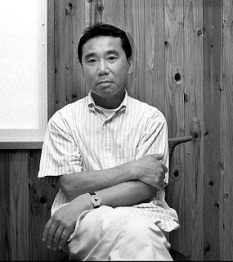
Haruki Murakami is a massive author celebrity in his native Japan, as well as around the world. Perhaps best known for one of his early works, Norwegian Wood, many of his other books have gone on to become just as popular, such as The Wind-Up Bird Chronicle, Kafka on the Shore, and most recently with his epic three-volume tome, 1Q84.
When one picks up a Murakami book — whether it be a novel or short story collection — one knows they are in for a real treat, as the story will be unique and fascinating and certain to be one wild ride, but it is all due to the characters. Murakami begins with a character, a type of person you likely haven’t met before, with an interesting life, that immediately draws you into the story, and it is the choices and decisions that this character makes that drives the story.
You may be saying: well this is true for all stories, that characters makes choices and the story moves forward, but they key is whether an event happens in a story that forces a character to make a decision, or whether the character makes a decision that then forces an event in the story.
With Murakami it’s always about the character making that decision or choice that forces the event and moves the story along.
The same can be said for John Irving.
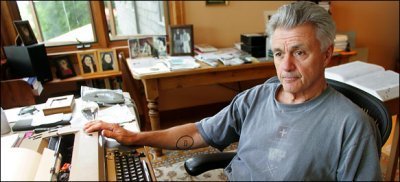
Irving is perhaps best known for his bestselling novel, The Cider House Rules (as well as the popular movie adaptation), but has written many books that have become just as big, including The World According to Garp The Hotel New Hampshire, and A Prayer for Owen Meany. His most recent book is In One Person.
While Murakami may perhaps be best known for having fascinating individual characters with each of his books, Irving is the master of the all star cast of special people.
To say that Irving’s characters are flawed characters is putting it extremely lightly for his books; everyone has some sort of problem, but it is because of this that the characters make the choices that they do that further the plot and lead to the next chapter. And this is what Irving’s readers enjoy most about his books, as they look forward to seeing where these characters’ choices will lead them.
Nobody in this world is perfect, and so when we read about flawed characters, we perhaps can see a little of ourselves in them and are therefore fascinated in seeing where they end up.
Writers or books aren’t better for being plot-driven or character-driven, and readers shouldn’t think otherwise. Everyone is different; which is why there are many different types of writers and many different types of readers in the world. Character-driven stories and books will continue to be written by authors like Haruki Murakami, John Irving and many others; and there will continue to be many readers for these types of works who receive great entertainment in reading about what happens to a character when they make a specific choice or decision.


Bookbanter Column: The Book Dump, or What People Are Reading (January 11, 2013)
From February through July of this year, a good solid six-month period, I worked in the book department at Dimple Records in Sacramento. Most of my job consisted of unboxing, sorting and shelving thousands and thousands of books that had been purchased for the company through their used book buyback program, available at all of their retail stores. There were literally boxes and boxes of books coming into the warehouse each day from the various stores, and it was my job to organize them and get them put on the shelf in the right sections.

Another warehouse consisted of many rows of shelves all sectioned and organized by subject and genre. For the first few months I quickly filled up these shelves, and then when they were full and all set to go, the books and shelves were taken to the Citrus Heights store location, which was remodeled and organized to accommodate all these new books. There were approximately 15,000 used books made available at the Citrus Heights store.
And then my work began again from scratch, as I began filling up all news shelves for what would eventually become the first (of hopefully many) Dimple Books book stores which opened its doors in July. At this store there were over 30,000 used books. In my time with Dimple I sorted through and organized over 50,000 books.

In the six-month period I became an observer as well as a book worker, noticing what titles, authors, names, genres kept appearing and reappearing; who are the bestsellers of the used book world, and what are people reading most when they buy books, be they new or used. I collected my rough data together and below are the interesting results.
They are organized by genre and subject and are roughly in order of most copies of books by the same author and/or most multiple copies of the same book by an author.
Fiction: Nicholas Sparks, Jodi Picoult, Jonathan Franzen, Sara Gruen, Khaled Hosseini, Kathryn Stockett, Barbara Kingsolver, Tim Lahaye, Anita Shreve, Mitch Albom, Alice Sebold, Alice Walker.
Mystery: James Patterson, John Grisham, Patricia Cornwall, John Sandford, Janet Evanovich, Michael Crichton, Iris Johansen, Charlaine Harris.
Romance: Nora Roberts, Debbie Macomber, Mary Balogh, Danielle Steel.
Science Fiction/Fantasy: Piers Paul Anthony, Orson Scott Card, Douglas Adams, Frank Herbert/Brian Herbert, Robert Jordan, Anne McCaffrey, J. R. R. Tolkien, Star Trek series, Star Wars series.
Children’s Books: J. K. Rowling, Brian Jacques, Lemony Snicket, Eoin Colfer.
Young Adult: Stephenie Meyer, P. C. Cast, Ann Brashares, Christopher Paolini.
Biography: Elizabeth Gilbert, Frank McCourt.
Politics: Al Franken, Rush Limbaugh, Michael Moore, Michael Savage, Bill O’Reilly.
History: Tom Brokaw.
True Crime: Anne Rule, John Grisham.
Religion: Sylvia Browne, Rhonda Byrne, Rick Warren.
Psychology: Jack Canfield, Phil McGraw.
Animals: John Grogan.
Health: Kevin Trudeau.
The question perhaps remains as to whether it is a good thing that there are so many multiple copies of the same book, and so many books of a particular author; or whether it is a bad thing. On the one hand people ultimately bought these many books and helped make said book and author a bestseller, they presumably enjoyed the book and recommended it to friends and family; perhaps bought copies as gifts.
But on the other hand, they also chose at some point to get rid of the book they didn’t consider worth keeping. Was it a book received as a gift that they had no interest in reading and got rid of; was it something they started reading and didn’t enjoy? Or did they finish it and felt they had no need to keep it or to read it again, and got rid of it?
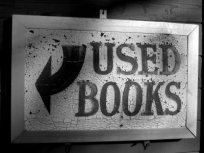
When one brings books in for buybacks at Dimple, one can choose whether to receive cash, or store credit, which one can use to either buy more books, or anything else that Dimple sells (except gift cards). This is simply part of the world of used book buying and reading: when one is done with the book and doesn’t want to keep it, they sell it back at a used bookstore for credit or money to buy more books.
So perhaps all these copies that were bought back were just part of this used book buying and buying back cycle. But this then possibly adds fuel to the question of whether these books can truly be considered “bestsellers,” since many of them ended up at the Dimple used bookstore. And one will see the same if they go to other used bookstores, with large sections of many of these authors, as well as at thrift stores like Goodwill and Salvation Army.
These books became a bestseller by the selling of a certain number of copies in stores and online as tracked by the particular publisher. But when so many of the copies were not kept by the owner for not being enjoyable enough or worth keeping for any particular reason, it seems that while they may have been bestsellers at the time of release, they weren’t necessarily deemed to be very good books.
Perhaps at a future point in time in addition to the tracking of book sales and determining whether they are bestsellers or not, there will be a contrasting tracking system used in bookstores as well as online tracking to record just how many of these “bestsellers” ended up being bought back at used bookstores, and how soon after said book was released, and applied to a different kind of scale that determines whether the book deserved to be a bestseller for either being a genuinely good book, or one with a popular author listed on the cover that simply sold a lot of copies.


Bookbanter Column: Get Lost in a Good Fantasy Series Part 9: His Dark Materials (October 26, 2012)
While technically Philip Pullman’s His Dark Materials trilogy is classed as a children’s or young adult series, it has some very adult themes, features large and complex fantastical and alternate worlds, and has been issued with adult covers, since apparently adults can’t bear the thought of another adult seeing them reading a book with a kid on the cover.
The trilogy has been loved and read by many, continues to be a bestseller even though the first book in the series was published in Great Britain under the original title of Northern Lights in 1995.
And at the same time it has gotten a lot of flack and received a lot of criticism from various groups for its content and what it’s supposedly putting in the minds of children reading it.
Regardless of which side one may fall on this series, it still remains one of the most developed and interesting children’s epic fantasy trilogies that goes beyond just telling a good story and leaves the reader thinking on many matters.
The Golden Compass (Northern Lights)
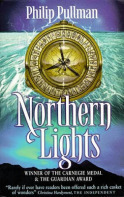
This is the story of a young girl who doesn’t know what to do or what is going to happen with her life, but soon discovers that she is on a specific course of destiny that she is unable to avoid.
While The Golden Compass is considered a children’s book, like the Harry Potter series, it is written with an adult voice in an adult language, with adult themes. It seems that British authors give their young readers a lot more credit that American authors. The result is the first book in the His Dark Materials trilogy that is by no means “just a kid’s book.”
Lyra Belacqua is a young girl who spends her days roaming the many hallways and rooms of Jordan College, Oxford, where she makes friends with everyone regardless of class or status. She’s just looking to have a good time and loves taking risks, whether it be climbing the roof of the college, or chasing and attacking the gyptians who show up every once in a while on the river.
This is a different world to ours, where everyday electricity doesn’t exist. This is a world of zeppelins, steam and air powered machinery, gyroscopes and wheels and cogs, essentially a steam punk world. Also in this world every person has what is known as a dæmon, essentially the embodiment of a person’s soul in the form of an animal. When young, children’s dæmons can change form, but when they reach puberty the dæmon settles on a single form for the rest of their lives, giving one an insight into the person’s nature.
But Lyra’s world changes when first she saves her father, Lord Asriel, from being poisoned, and then learns of his work in the distant icy north where work is being done with something called Dust, the northern lights, and something about another world in the sky. Lyra then meets Mrs. Coulter, who she immediately takes a liking to for she is so strong and impressive and knowledgeable, that is until Lyra discovers that she is the one who has been kidnapping children and taking them to the north for experimentation. Managing to escape, Lyra joins with the gyptians who head north to find out what is going on with all this business about kidnapped children and Dust. The rumors are terrible. It is said that experimentation is being on separating children from their dæmons which, considering it is taboo for a person to even touch another’s dæmon, does not bode well for Lyra and the gyptians.
It is in the North that Lyra finally discovers everything that is going and more importantly, why it is happening, as well as a giant armored warrior polar bear, Iorek Byrnison, known as panserbjørne; and a Texan balloon-fighting man called Lee Scoresby.
His Dark Materials, in my opinion, is even better than the Harry Potter series for the subject matter is far more complex with truths that relate to every reader.
The Subtle Knife
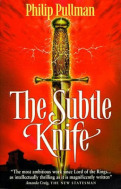
The golden compass of the first book was a special future-telling instrument which, when used correctly, can answer any question you ask it.
Lyra happens to be of the chosen variety that has the natural skill to read it. In this book we meet our next hero, Will Parry, who is from our world. He finds and becomes the beholder of the subtle knife, a special knife with one side so sharp it can cut any material object, and the other side so sharp it can cut through the fabric of reality and open a doorway into another world. And so the reader realizes the great complexity of this universe with its many worlds.
Lyra and Will now continue their journey, both in search of their fathers with the help of many unusual characters like giant bears and witches.
The Amber Spyglass
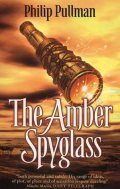
In the final and lengthier conclusion to the trilogy, the full realization of this story is brought to light to such an extent that everything now becomes symbolic in some way, literature quotes begin each chapter, and the depth and complexity of the novel passes far beyond any childhood or young adult fantasy, presenting a complicated plot and moral for even adults to handle.
It is in this final book that the strengths and beliefs of our heroes will be tested to their extent, while our own beliefs will be in danger, when the basis for all religion and faith in all worlds is brought into question and threatened.



